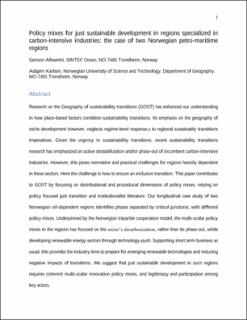| dc.contributor.author | Afewerki, Samson | |
| dc.contributor.author | Karlsen, Asbjørn | |
| dc.date.accessioned | 2022-06-01T13:58:56Z | |
| dc.date.available | 2022-06-01T13:58:56Z | |
| dc.date.created | 2021-06-21T12:49:11Z | |
| dc.date.issued | 2021 | |
| dc.identifier.citation | European Planning Studies. 2021, 1-22. | en_US |
| dc.identifier.issn | 0965-4313 | |
| dc.identifier.uri | https://hdl.handle.net/11250/2997264 | |
| dc.description.abstract | Research on the Geography of Sustainability Transitions (GOST) has enhanced our understanding in how place-based factors condition sustainability transitions. Its emphasis on the geography of niche development, however, neglects regime-level responses to regional sustainably transitions imperatives. Given the urgency of sustainability transitions, recent sustainability transitions research has emphasized an active destabilization and/or phase-out of incumbent carbon-intensive industries. However, this poses normative and practical challenges for regions heavily dependent in these sectors. Here the challenge is how to ensure an inclusive transition. This paper contributes to GOST by focusing on distributional and procedural dimensions of policy mixes, relying on just transition and institutionalist literature. Our longitudinal case study of two Norwegian oil-dependent regions, Stord and Verdal identifies phases separated by critical junctures, with different policy mixes. Underpinned by the Norwegian tripartite cooperation model, the multi-scalar policy mixes in the regions has focused on the sector’s decarbonization, rather than its phase-out, while developing renewable energy sectors through technology-push. Supporting short term business as usual, this provides the industry time to prepare for emerging renewable technologies and reducing negative impacts of transitions. We suggest that just sustainable development of such regions requires coherent multi-scalar policy mixes, and legitimacy and participation among key actors. | en_US |
| dc.language.iso | eng | en_US |
| dc.publisher | Taylor and Francis | en_US |
| dc.rights | Navngivelse-Ikkekommersiell 4.0 Internasjonal | * |
| dc.rights.uri | http://creativecommons.org/licenses/by-nc/4.0/deed.no | * |
| dc.title | Policy mixes for just sustainable development in regions specialized in carbon-intensive industries: the case of two Norwegian petro-maritime regions | en_US |
| dc.title.alternative | Policy mixes for just sustainable development in regions specialized in carbon-intensive industries: the case of two Norwegian petro-maritime regions | en_US |
| dc.type | Peer reviewed | en_US |
| dc.type | Journal article | en_US |
| dc.description.version | acceptedVersion | en_US |
| dc.rights.holder | This is the accepted version of the article. Published version is available: https://doi.org/10.1080/09654313.2021.1941786 | en_US |
| dc.source.pagenumber | 1-22 | en_US |
| dc.source.journal | European Planning Studies | en_US |
| dc.identifier.doi | 10.1080/09654313.2021.1941786 | |
| dc.identifier.cristin | 1917260 | |
| dc.relation.project | Norges forskningsråd: 321954 | en_US |
| dc.relation.project | Norges forskningsråd: 255400 | en_US |
| cristin.ispublished | true | |
| cristin.fulltext | postprint | |
| cristin.fulltext | original | |
| cristin.qualitycode | 1 | |

